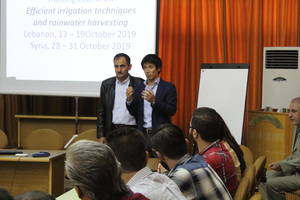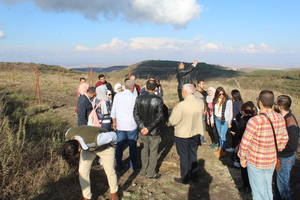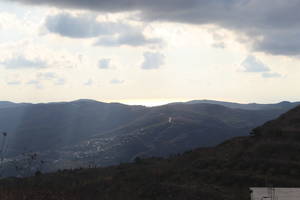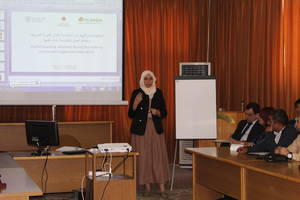Training on Efficient irrigation techniques and rainwater harvesting
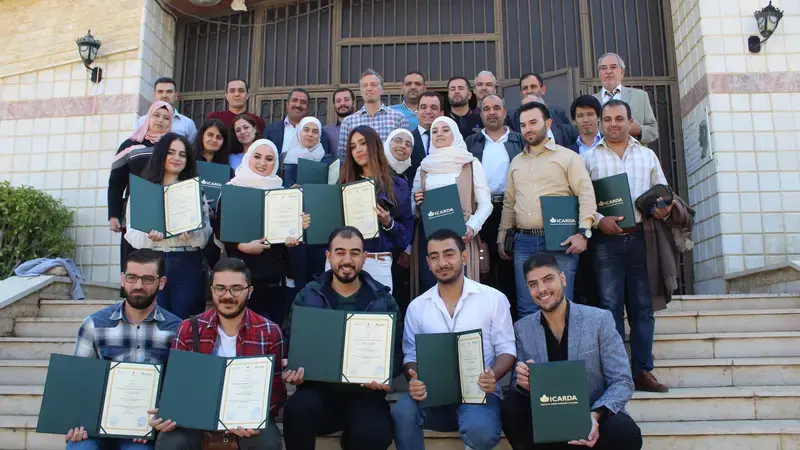
Lebanon, 13th October to 19th October 2019 and Syria, 28th October to 31st October 2019. The FAO-ICARDA collaborative training targeted 24 trainees from the Syndicate of Agricultural Engineers for seven days in Lebanon in the ICARDA Terbol station with a following field visit for four days in Syria. The participants came from different governorates all over Syria.
The objective was to train the participants in recent classical techniques of irrigation and rainwater harvesting to increase agricultural production. The training topics were related to the national priorities of improved food and nutrition security. They focused on Soil-water-plant-atmosphere relationships and concepts and principles of agricultural water use efficiency and water productivity.
The training covered the following asujects:
- Soil-water-plant-atmosphere relationships
- Concepts and principles of agricultural water use efficiency/ water productivity,
- Modern irrigation systems/scheduling/management
- Methods and implementation of rainwater harvesting practices
- Irrigation and water harvesting systems operation and maintenance
- Practical sessions and field demonstrations
After the training, participants were able to operate modern irrigation systems, manage irrigation water at the farm level, determine suitable cropping patterns for improved water and land productivity and implement rainwater harvesting practices. On return the trainees will train other experts or targeted beneficiaries in a cascade way, which will have an impact that exceeds the immediate result of the training and will improve both food and nutrition security as well as the livelihoods in the communities.
Background
Like many arid/semi-arid countries, the Syrian Arab Republic is affected by climate change. Exacerbating this problem, as a country suffering the effects of prolonged conflict, Syria also faces social, economic and environmental challenges. As such, the agricultural sector has been devastated by the loss of cultivated land, destruction of farm machinery and irrigation systems, shortages of and high costs of farming inputs and fuel, severely damaged infrastructure, compromised power supplies and out-migration of farmers towards more secure areas.
Despite eight years of crisis in Syria, agriculture remains a key part of the economy. The sector still accounts for an estimated 26 percent of gross domestic product (GDP) and represents a critical safety net for the 6.7 million Syrians – including those internally displaced - who remain in rural areas. (FAO 2017: page 3).
However, agriculture and the livelihoods that depend on it have suffered massive loss. Today, food production is at a record low and 6.5 million people live severely food insecure, unable to meet their daily food needs.
The challenges posed by climate change further aggravate the situation. In 2017/18 the country experienced the worst drought in 30 years. Cereal production and the availability of staple food was consequently severly affected and barley production was lowest since 2008. (FAO: Syrian Arab Republic Humanitarian Response Plan 2019 )
Ultimately, the Syrian crisis has affected the capacity of the Syrian agricultural experts to address farmers' immediate needs. And even though the crisis is not over, the conditions for investing in the recovery of the sector are present in many areas of the countries. Such investments can reduce migration and rebuilt the livelihoods of the crisis-ridden communities.
It is against this background, that the "Training for All" project has been implemented. It started since March 2017, UNDP, UN Habitat, FAO, UNFPA and WHO initiated a range of capacity building activities to address the additional priority for capacity-building needs in Syria under financial support of the government of Japan. This is done in a way that enables the agricultural sector to recover and achieve food and nutrition security for crisis affected people and their communities.
Video interviews
Interview with Eng. Rahaf Shakko,
Irrigation expert from Damascus. She was contracted by ICARDA as an external lecturer for the training.

